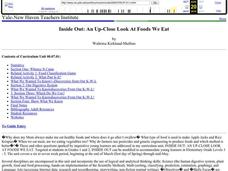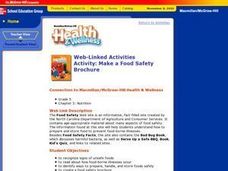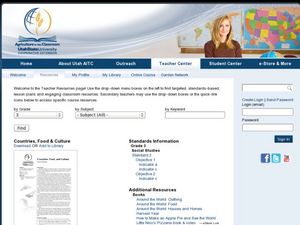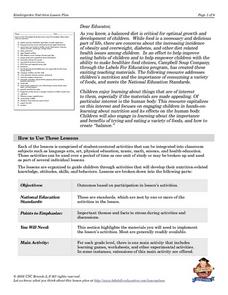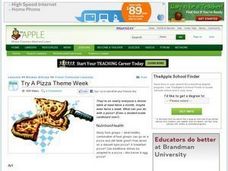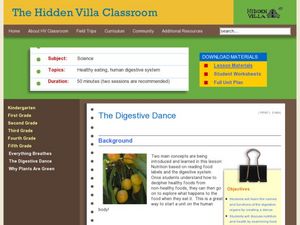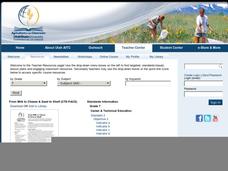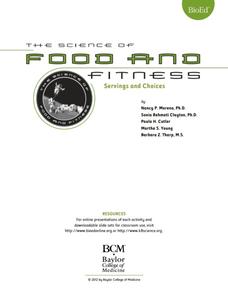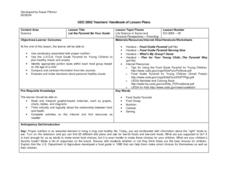Curated OER
Familiarizing Students with the 5 Food Groups
Students review a variety of foods and classify them into food groups. They identify the benefits of each food group to our bodies and consider how deficiencies of these groups affect humans. They sort pictures, view a video and write...
Curated OER
Dietary Guidelines/Food Pyramid
Learners study the recommended Dietary Guidelines for Americans and the Food Guide Pyramid. They discuss the foods they eat, watch a video about the Food Pyramid and examine actual foods portioned out into recommended serving sizes.
Curated OER
Food Pyramid Menu
Young scholars analyze the food pyramid. For this food pyramid lesson, students evaluate their nutritional needs. Young scholars record their eating habits and determine if their food choices were healthy.
Curated OER
Nutrition Making Healthy Food Choices
First graders comprehend the importance of making healthy food choices for a healthy heart. They discuss the connection between what they eat and a healthy body and heart. Students discriminate between healthy foods, or "heart-smart...
Curated OER
THE FOODS WE EAT
Students discuss the five food groups and the seven basic nutrients. They decorate Food We Eat booklet pages with pictures of foods found on background, rubber stamp and animation tools in KidPix. (Booklet has a page for each food group.)
Curated OER
Inside Out: An Up-Close Look At Foods We Eat
Fourth graders identify the origins of meats and vegetables consumed by humans on a daily basis. They classify foods (meats, dairy products, grains...) and create a food pyramid.
Curated OER
Food Web Mystery
Students describe typical marine food webs, and explain why food is generally scarce in the deep-ocean environment. They discuss reasons that seamounts may support a higher density of biological organisms than would appear to be possible.
Curated OER
How Much of Each Nutrient Does Your Body Need, and How Can You Find Out What Is In Each Food?
Fifth graders practice reading food labels to find nutrients in foods. In this health lesson, 5th graders read food labels and discuss the recommended daily allowance of each nutrient. They compare this to the food pyramid and create a...
Curated OER
Dietary Guidelines/Food Pyramid Test
Students review Dietary Guidelines and the Food Guide Pyramid. They take a quiz listing recommended dietary guidelines and explain their function and implementation.
Curated OER
Make a Food Safety Brochure
Students create brochures that inform their families how to prepare and store food to prevent food-borne illnesses. They research food safety facts and proper food-handling techniques on the internet.
Curated OER
Countries, Food and Culture
Third graders explore food production by researching culinary culture on the Internet. In this global food lesson, 3rd graders read assigned text about the different dietary habits of foreign cultures based upon their environment....
Curated OER
The ABC's of Breakfast
Students identify the food group of various culturally diverse breakfast foods and discuss the importance of eating a healthy, well-balanced breakfast every morning. They then try different foods that begin with the letter A, B and C and...
Curated OER
Try A Pizza Theme Week
Students explore all the things they could do with a pizza. They become aware of food groups and nutritional needs, make decorated cardboard pizzas, interact with pizza slices and fractions, create stories to go along with their...
Curated OER
Calcium Counts
Learners evaluate the food pyramid. In this dairy nutrition lesson, students identify the position of the milk group on the food pyramid, then determine their daily calcium requirement and how they can meet that requirement.
Curated OER
The Digestive Dance
Students read food labels to compare healthy verses non healthy food and then use diagrams to create a poster of the digestive system. In this food lesson plan, students move the food down the digestive track along the digestive system.
Curated OER
What's on My Plate?
Kids work together in groups to discuss and understand the differences between a typical diet and a healthy one. They use the My Plate recommendations to compare what they eat with what they should be eating according to the MyPlate...
Curated OER
From Milk to Cheese & Seed to Shelf
Learn about food production by making cheese, seeing how a seed gets to a shelf, and discussing food safety. Budding agriculturalists complete several activities and learn about food production, biotechnology, food preservation,...
Curated OER
Source Search: Agricultural Products
Farmers just farm, right? Find out how important agricultural products are to our modern society. Learners will explore the foods, textiles, and fuels made from industrial farm goods. They'll also explore the idea of choosing an...
Curated OER
Talking about Food, Expressing Likes and Dislikes
Students explore foods. In this nutrition lesson, students chorally respond to questions about a kitchen PowerPoint, complete a Venn diagram about breakfast and lunch foods, and play a food Bingo game.
Baylor College
Servings and Choices
An important part of balancing caloric intake to energy expenditure is knowing how many Calories you are consuming. In the fifth of a seven-lesson series on food and energy, learners estimate their daily caloric intake, then use a...
Curated OER
The Quicker the Better? Food Processing
Sixth graders explore food processing. In this food processing lesson, 6th graders investigate the effects of processing foods on the food's nutritional value. Students examine a variety of healthy snack options.
Curated OER
Let the Pyramid Be Your Guide
Students chart foods on the food guide pyramid and design nutritional food plans that include all the food groups.
Curated OER
Healthy Snacks Project Lesson
After learning why it is important to limit salt, fat, and sugar in their diets, divide your class into pairs or groups to complete this project. Each group will create two charts: unhealthy and healthy foods. They will cut out food...
Curated OER
Nutrition 3: Got Broccoli?
Learners discover why the human body needs food in order to survive. In groups, they analyze advertising for the foods they eat the most and try to identify the nutritional value of them as well. They complete a worksheet showing them...







